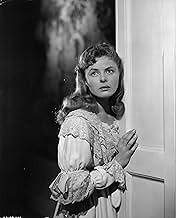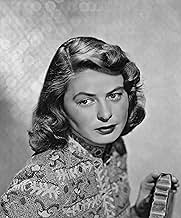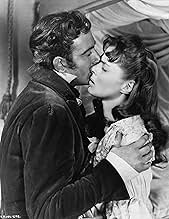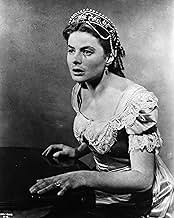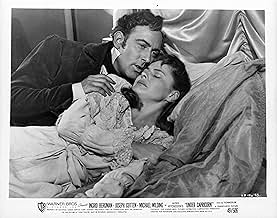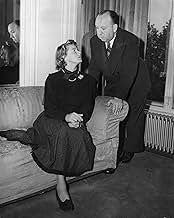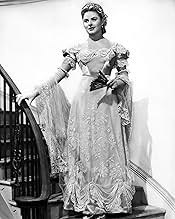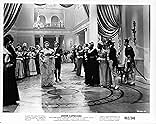Agrega una trama en tu idiomaA young gentleman goes to Australia where he reunites with his now married childhood sweetheart, only to find out she has become an alcoholic and harbors dark secrets.A young gentleman goes to Australia where he reunites with his now married childhood sweetheart, only to find out she has become an alcoholic and harbors dark secrets.A young gentleman goes to Australia where he reunites with his now married childhood sweetheart, only to find out she has become an alcoholic and harbors dark secrets.
- Dirección
- Guionistas
- Elenco
- Premios
- 3 premios ganados en total
- Major Wilkins
- (as Francis de Wolff)
Opiniones destacadas
There's little fault to be found with the settings, which are convincing enough. Some of the characters never really come to life, but there is still an interesting mix of them. The pace is one area that definitely could have been improved, and the pre-occupation with the long takes certainly doesn't help at all. The technique worked very well in Hitchcock's "Rope", because it meshed with the setting and the subject matter. It doesn't fit so well here in "Under Capricorn", and it often dilutes the suspense rather than increasing it.
By no means is it a total clinker - the story does have some interesting parts, and with a different approach it could have been suspenseful, even memorable. Hitchcock's technical skill is still present in many respects, and even Hitchcock's lesser achievements are still worth seeing.
The movie's overly-polished feel is consistent with the approach that was chosen. It's at least one case where the more familiar, less affected Hitchcock style would have resulted in a much better film.
The 1830s Australian setting proves very appropriate for the material, with the events unfolding in a newly-formed society with a primitive form of law enforcement, occupied by convicts and ex-convicts alike, where one's past is a dark secret of which nothing may be spoken. When an ambitious Irishman, Charles Adare (Michael Wilding), arrives in the Southern Land, the nephew of the new governor (Cecil Parker), he falls into an awkward friendship with the well-respected Sam Flusky (Joseph Cotton), an ex-convict who has made a name for himself on this new continent. Sam's wife, the beautiful Lady Henrietta Flusky (Ingrid Bergman), has suffered a mental breakdown, and, being an old childhood acquaintance, Charles considers it his duty to help this troubled woman to abandon her alcoholism and regain confidence in herself. Sprinkled about this stuffy Gothic melodrama are minor elements of suspense {most notable in the final scene featuring the scheming maid (Margaret Leighton)}, claustrophobia {as in Hitchcock's 'Rebecca (1940),' the old mansion is an character unto itself} and murder.
Though the story of 'Under Capricorn' isn't particularly interesting, and outstays its welcome by about one reel, the film is a fascinating feature from Alfred Hitchcock, and, if nothing else, exists as a testament to the director's technical ingenuity. The picture was Hitchcock's second in Technicolor, and its disastrous box-office performance led to the closure of the short-lived Transatlantic Pictures, which had been formed by himself and associate Sidney Bernstein after World War Two. The acting in the film is solid all around, without being particularly noteworthy, but the characters have enough twists to their personality to keep us watching. Long held as the forgotten black sheep of Hitchcock's output {except by the French, who apparently adored it}, 'Under Capricorn' is a worthy addition to the director's filmography, and stands as must-see viewing for all students of cinema.
1831: Irishman Charles Adare arrives in Australia to make his fortune, and soon hooks up with Sam Flusky, a wealthy landowner with a shady past and a business proposition. Ignoring the orders of his cousin, a local Governor, Charles continues to associate with Flusky and his alcoholic wife Henrietta, who was a friend of Charles' sister many years ago back in Ireland.
The long takes the film is composed of are often masterful. Whereas his previous film Rope felt like a gimmicky experiment (albeit a successful one), here the technique is perfected, and actually serves a purpose. It widens the scope to allow the actors room to deliver fine performances, and to exploit the lavish sets. It also serves to narrow the scope, either to focus attention or withhold crucial information until the last moment (it's especially effective at these two). This focusing/concealing also adds to the sense of Bergman's isolation and entrapment in her environment, and allows for some of the film's best shots.
I'm not a fan of Jack Cardiff, but his colour cinematography is considerably less jarring here than in his Powell-Pressburger outings, and although it does take a while to adjust the eyes, it's perfectly suited to the mood and setting.
Ingrid Bergman delivers what I consider to be her best performance. Henrietta is frail and very vulnerable - a pathetic creature. Yet the strength and dignity that she once possessed is glimpsed at the outset, and gradually comes to the fore without ever completely displacing that vulnerability.
Joseph Cotten likewise does an excellent job. His crippling inferiority complex dictates everything he does, and it's where the film gleans much of its drama. In his own way he's equally as pathetic as Henrietta; trapped in a different kind of mental prison. Sometimes he's unaware of his cruelty, believing himself to be doing the right thing; at others it's as if he can't help himself. He's a man who constantly tries to do good things, yet at every turn he's thwarted either by his own secret past, or his fear of that past. For a man so ostensibly powerful he's easy to knock down, and his reaction to these setbacks just reinforces his own negative perception of himself. This conflict is written on his every gesture and expression.
Michael Wilding's performance as Charles is less technically brilliant, but as the carefree, opportunistic cad who sees in Henrietta the chance to do an act of great kindness he's wonderful. There is great humanity in all three leads, but it's most overt and infectious in Wilding.
Irish aristocratic lady Henrietta (Bergman) elopes to Australia with her cruel lover Sam Flusky (Cotten). She gradually develops the illness dipsomania, what with her lover controlling her every move with over-bearing authority and their maid Milly (Leighton) plying her with drink. A childhood friend of Henrietta's, Charles Adare (Wilding) turns up and, realising pretty quickly that all is not well, tries to help her regain a sense of stability.
The film is a laughably overwrought costume melodrama, totally ill-suited to Hitchcock's playful, suspenseful directing style. A year previously, the director had made the thriller Rope, using experimental ten minute takes, and in this film he still seems to be in the habit of allowing scenes to go on and on (maybe not ten minutes, but some bits last for six or seven minutes without a single cut). Frequently, the film feels tediously unspooled as a result. The actors seem to over-act much of the time, but it's hard to see how they could've avoided this as much of the screenplay requires them to handle some horribly overripe dialogue and reactions. Under Capricorn is undoubtedly the least interesting film that Hitchcock ever made. Those who try to persuade us that it is a misunderstood masterpiece are, I'm sorry to report, well and truly kidding themselves.
¿Sabías que…?
- TriviaIn 1958, Cahiers du Cinema (French Film Magazine) voted this movie as one of the ten greatest movies of all time.
- ErroresAs the characters gather for the dinner party, fairly early on in the film, the camera tracks backwards across the dining room. The table has been pushed into the path of the camera by the time it comes into view, but the candlesticks are still shaking severely from the jerking appearance of the table (their shaking lessens as the take continues).
- Citas
[last lines]
Winter: We'll be sorry to lose you, sir.
Hon. Charles Adare: If I may say so, Winter, I'm sorry to go. Not a bad place. It is said that there is some future for it, there must be- it's a big country.
Winter: Then why are you leaving, sir?
Hon. Charles Adare: That's just it, Winter. It's not quite big enough. Bye, good luck.
- Créditos curiososOpening credits roll up over a map of Australia.
- Versiones alternativasThere is an Italian edition of this film on DVD, distributed by DNA Srl: "SOTTO IL CAPRICORNO (Il peccato di Lady Considine, 1949) New Widescreen Edition + FRAGILE VIRTÙ (1927)" (2 Films on a single DVD, with "Under Capricorn" in double version 1.33:1 and 1.78:1), re-edited with the contribution of film historian Riccardo Cusin. This version is also available for streaming on some platforms.
- ConexionesEdited into Histoire(s) du cinéma: Fatale beauté (1994)
Selecciones populares
Detalles
- Tiempo de ejecución1 hora 57 minutos
- Color
- Relación de aspecto
- 1.37 : 1
Contribuir a esta página


